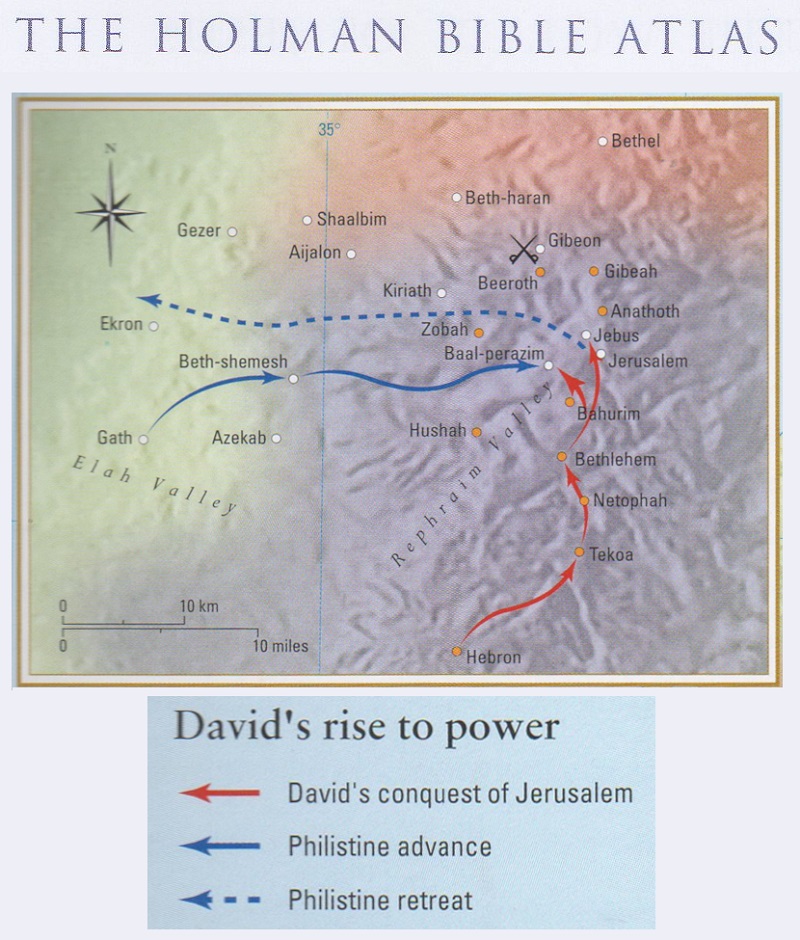Gibeah was a town located roughly halfway between Bethel (to the north) and Jerusalem (to the south).
Aaron's son, Eleazar, was buried at Gibeah.

Gibeah first appeared in Joshua 15:57 as part of the allotment of 10 towns for the tribe of Judah. By
chapter 18, it had changed hands when it was listed among the 14 towns of the Benjamites in Joshua 18:28.
Joshua 24:33: "And Eleazar son of Aaron died and was buried at Gibeah, which had been allotted to his son Phinehas in the hill country of Ephraim".
In Judges 19, the immoral people of Gibeah repeated the situation before Sodom was destroyed when they raped the concubine of a Levite and killed her. In his sorrow, the Levite dismembered the woman and sent the pieces throughout the land as a warning of the sins of the people. In Judges 20, war was waged against the Benjamites and their numbers were seriously diminished.
1 Samuel 10:5 called Gibeah a "Philistine outpost". Turmoil between the Isaelites and Philistines was mounting, setting the stage for
Israel's first king. 1 Samuel 10:26:
"Saul also went to his home in Gibeah, accompanied by valiant men whose hearts God had touched".
In this passage (1 Samuel 11:1-7), Gibeah was also stated as Saul's hometown in verse 4:
1. Nahash the Ammonite went up and besieged Jabesh Gilead. And all the men of Jabesh said to him, "Make a treaty with us, and we will be subject to you."
2. But Nahash the Ammonite replied, "I will make a treaty with you only on the condition that I gouge out the right eye of every one of you and so bring disgrace on all Israel."
3. The elders of Jabesh said to him, "Give us seven days so we can send messengers throughout Israel; if no one comes to rescue us, we will surrender to you."
4. When the messengers came to Gibeah of Saul and reported these terms to the people, they all wept aloud.
5. Just then Saul was returning from the fields, behind his oxen, and he asked, "What is wrong with the people? Why are they weeping?" Then they repeated to him what the men of Jabesh had said.
6. When Saul heard their words, the Spirit of God came upon him in power, and he burned with anger.
7. He took a pair of oxen, cut them into pieces, and sent the pieces by messengers throughout Israel, proclaiming, "This is what will be done to the oxen of anyone who does not follow Saul and Samuel." Then the terror of the LORD fell on the people, and they turned out as one man.
There were mentions of Gibeah in 1 Samuel 13, 14 and 15 as the Israelites tried to defeat the Philistines.
Saul's apprentice, David, gained favor with the Israelites as Saul's influence waned. Several times Saul tried to kill David who kept fleeing from him. Ziphites (desert dwellers from Ziph) near Gibeah approached Saul twice in
1 Samuel 23:19 and 26:1 to tell him of David's whereabouts.
1 Samuel 22:6:
6. Now Saul heard that David and his men had been discovered. And Saul, spear in hand, was seated under the tamarisk tree on the hill at Gibeah, with all his officials standing around him.
Occurrences of Gibeah resurfaced when the Ark of the Covenant was being brought to Jerusalem. It had been captured by the Philistines, then returned.
2 Samuel 6:2-4 (King James version):
2. And David arose, and went with all the people that were with him from Baale of Judah, to bring up from thence the ark of God, whose name is called by the name of the LORD of hosts that dwelleth between the cherubims.
3. And they set the ark of God upon a new cart, and brought it out of the house of Abinadab that was in Gibeah: and Uzzah and Ahio, the sons of Abinadab, drave the new cart.
4. And they brought it out of the house of Abinadab which was at Gibeah, accompanying the ark of God: and Ahio went before the ark.
Because anyone who came into contact with the Ark met their demise, David was afraid to go near it.
At Gibeah, the broken treaty between the Gibeonites and Israel was recitfied to stop a 3 year famine in 2 Samuel 21 during the reign of king David.
1 Chronicles 11:31 and 2 Samuel 23:29 named "Ithai son of Ribai from Gibeah in Benjamin" as one of David's "mighty men".
Abijah was the grand-son of Uriel from Gibeah. 2 Chronicles 13:2:
1. In the eighteenth year of the reign of Jeroboam, Abijah became king of Judah,
2. and he reigned in Jerusalem three years. His mother's name was Maacah, a daughter of Uriel of Gibeah. There was war between Abijah and Jeroboam.
Gibeah had 3 last references in the prophetic book of Hosea.
Hosea 5:8:
8. "Sound the trumpet in Gibeah, the horn in Ramah. Raise the battle cry in Beth Aven ; lead on, O Benjamin.
Hosea 9:98:
9. They have sunk deep into corruption, as in the days of Gibeah. God will remember their wickedness and punish them for their sins.
Hosea 10:98:
9. "Since the days of Gibeah, you have sinned, O Israel, and there you have remained. Did not war overtake the evildoers in Gibeah?